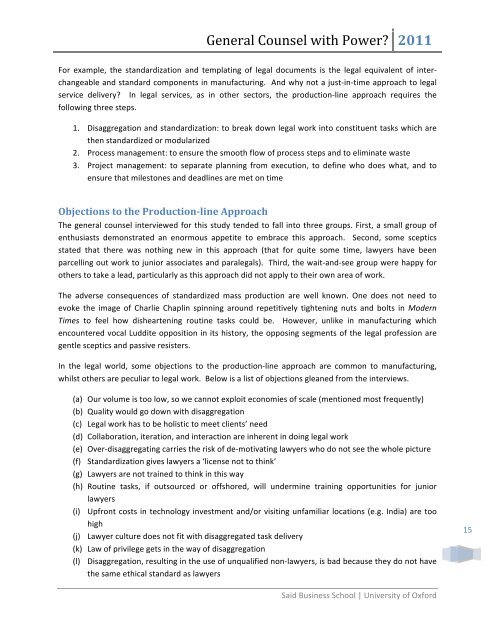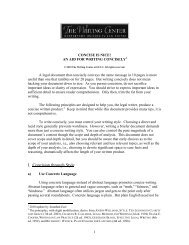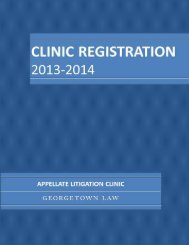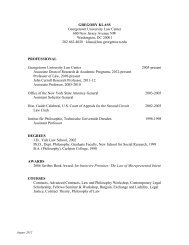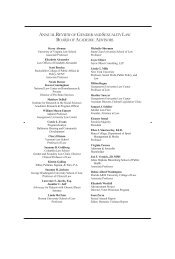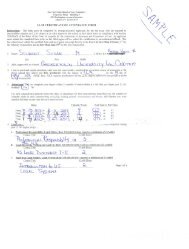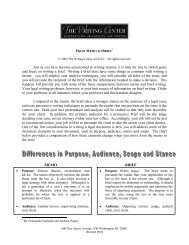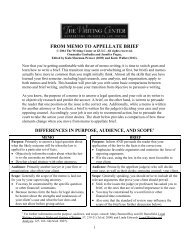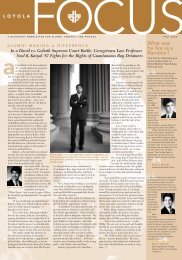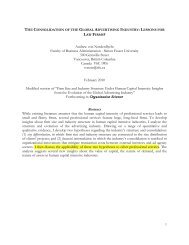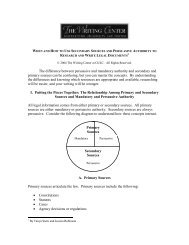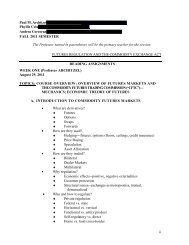Date: April 12, 2013 Topic: The Shrinking ... - Georgetown Law
Date: April 12, 2013 Topic: The Shrinking ... - Georgetown Law
Date: April 12, 2013 Topic: The Shrinking ... - Georgetown Law
Create successful ePaper yourself
Turn your PDF publications into a flip-book with our unique Google optimized e-Paper software.
General Counsel with Power? 2011 <br />
For example, the standardization and templating of legal documents is the legal equivalent of inter-changeable<br />
and standard components in manufacturing. And why not a just-‐in-‐time approach to legal <br />
service delivery? In legal services, as in other sectors, the production-‐line approach requires the <br />
following three steps. <br />
1. Disaggregation and standardization: to break down legal work into constituent tasks which are <br />
then standardized or modularized <br />
2. Process management: to ensure the smooth flow of process steps and to eliminate waste <br />
3. Project management: to separate planning from execution, to define who does what, and to <br />
ensure that milestones and deadlines are met on time <br />
Objections to the Production-line Approach <br />
<strong>The</strong> general counsel interviewed for this study tended to fall into three groups. First, a small group of <br />
enthusiasts demonstrated an enormous appetite to embrace this approach. Second, some sceptics <br />
stated that there was nothing new in this approach (that for quite some time, lawyers have been <br />
parcelling out work to junior associates and paralegals). Third, the wait-‐and-‐see group were happy for <br />
others to take a lead, particularly as this approach did not apply to their own area of work. <br />
<strong>The</strong> adverse consequences of standardized mass production are well known. One does not need to <br />
evoke the image of Charlie Chaplin spinning around repetitively tightening nuts and bolts in Modern <br />
Times to feel how disheartening routine tasks could be. However, unlike in manufacturing which <br />
encountered vocal Luddite opposition in its history, the opposing segments of the legal profession are <br />
gentle sceptics and passive resisters. <br />
In the legal world, some objections to the production-‐line approach are common to manufacturing, <br />
whilst others are peculiar to legal work. Below is a list of objections gleaned from the interviews. <br />
(a) Our volume is too low, so we cannot exploit economies of scale (mentioned most frequently) <br />
(b) Quality would go down with disaggregation <br />
(c) Legal work has to be holistic to meet clients’ need <br />
(d) Collaboration, iteration, and interaction are inherent in doing legal work <br />
(e) Over-‐disaggregating carries the risk of de-‐motivating lawyers who do not see the whole picture <br />
(f) Standardization gives lawyers a ‘license not to think’ <br />
(g) <strong>Law</strong>yers are not trained to think in this way <br />
(h) Routine tasks, if outsourced or offshored, will undermine training opportunities for junior <br />
lawyers <br />
(i) Upfront costs in technology investment and/or visiting unfamiliar locations (e.g. India) are too <br />
high <br />
(j) <strong>Law</strong>yer culture does not fit with disaggregated task delivery <br />
(k) <strong>Law</strong> of privilege gets in the way of disaggregation <br />
(l) Disaggregation, resulting in the use of unqualified non-‐lawyers, is bad because they do not have <br />
the same ethical standard as lawyers <br />
15 <br />
Said Business School | University of Oxford


